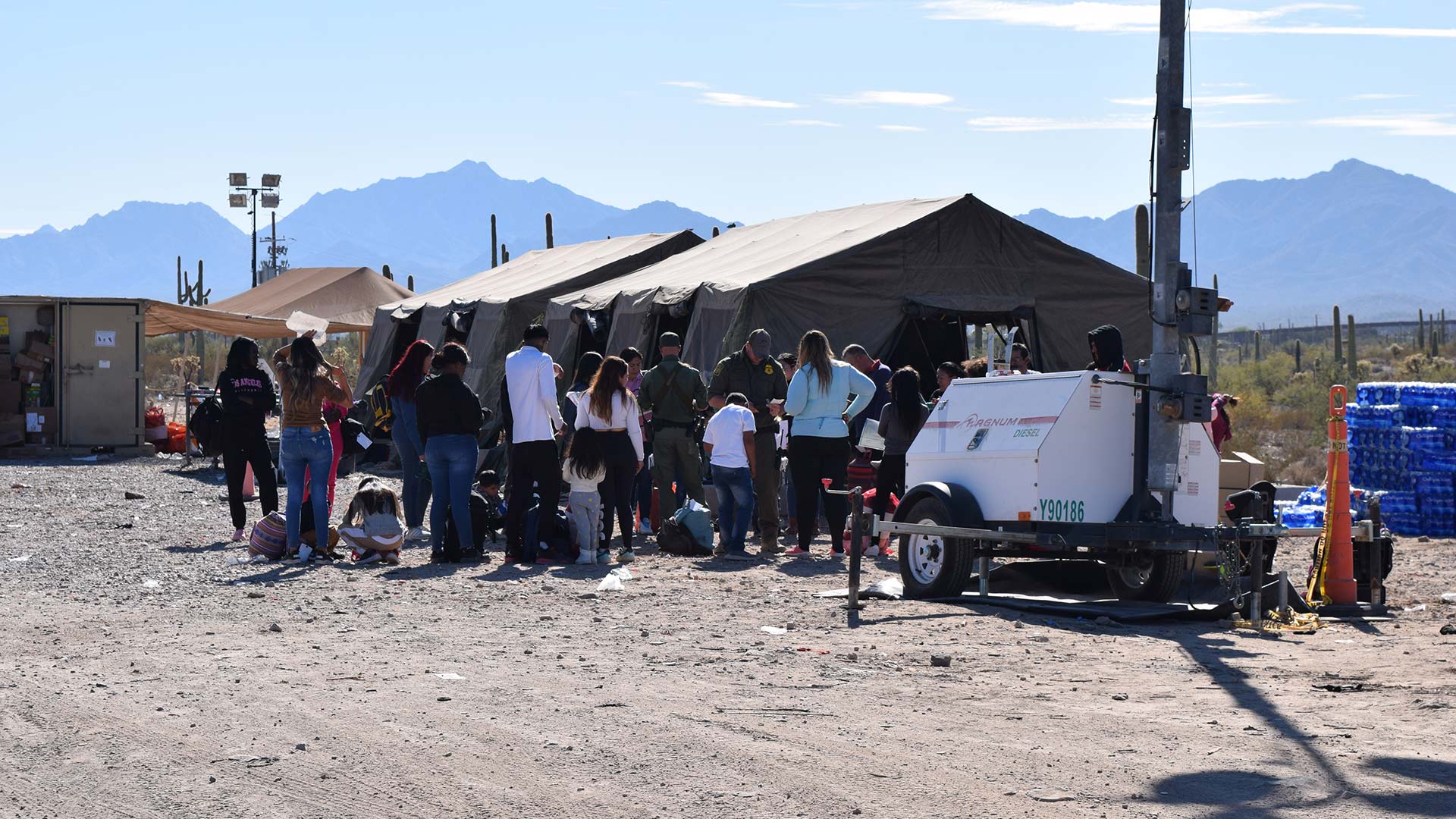 Border Patrol process families and children who crossed the border near Lukeville, Arizona, at a makeshift processing center, in December 2023.
Border Patrol process families and children who crossed the border near Lukeville, Arizona, at a makeshift processing center, in December 2023.
On a recent Friday, dozens of migrant families eat breakfast at the Kino Border Initiative in Nogales, Sonora. Kids run around as volunteers spoon heaps of huevitos and frijoles with warm tortillas onto people’s plates.
A soft-spoken 27-year-old named Rosa is here with her son, who’s 9. We’re only using Rosa’s first name because she fled threats on her life and is afraid she could be found. Near the noisy kitchen, Rosa says in November they fled their little town in the southern Mexican state of Guerrero, about 1,500 miles south of here.
She had endured threats and then physical attacks from men who had lost a land dispute with her father. She reported the incidents, but in the end, the authorities wouldn’t help her.
Rosa says, “Mi vida corrió peligro. También estaba exponiendo mucho a mi niño y decidí salir. Es que ya no tenía una alternativa.”
She says her life was in danger and her child was at risk so she decided to leave. She no longer had an alternative.
Most migrants this center helps now come from southern Mexico, says spokesperson Pedro De Velasco. Many, he says, have small children.
“If we only considered Guerrero as a country, it would be the top one country,” De Velasco says. “A lot of people are fleeing Guerrero. And they tell us about this total impunity. The cartels are pretty much running towns.”
In the past, De Velasco says, most migrants told them they were coming to the U.S. for economic reasons. Now, more than 83% say they’re fleeing violence.
Ariel Ruiz Soto with the Migration Policy Institute says Mexican cartels have routed many of these migrants to Border Patrol’s Tucson Sector because officials there are overwhelmed.
“When they see that Tucson is not able to keep up with the processing of migrants, or at least most migrants are being released, then that’s when the smuggling groups take that opportunity and take advantage and advertise it as: If you go through Tucson and you’re a family, you’re likely to go through,” he says.
He says many of these families will eventually get removed from the country.
In 2022 the Biden administration opened pathways for tens of thousands of Venezuelans, also fleeing violence and economic upheaval, offering them “humanitarian parole.” Last year, that was expanded to include people from Haiti, Cuba and Nicaragua.
But there’s nothing like that specific to this new wave of Mexican families crossing into the U-S now.
Rosa, who wants to enter legally, says her only hope now is to use the CBP One app, which only allows a limited number of people to apply for humanitarian parole. She gets on the app every morning, trying to secure an appointment for herself and her son. She’s had no luck so far.
Rosa says, “La verdad es que es más desesperante, porque amanecer con esa esperanza, pero te das cuenta que no es así. Tienes que volver a pedir la cita.”
She says, it’s a desperate situation to wake up with the hope of getting an appointment and realizing you’re not going to, and you’re going to have to try again.
Rosa doesn’t know how long it will take, and after about three months, she’s running out of shelters to stay at.
She says, “Salí de Guerrero con ese temor pero también con ese valor de que al menos encontrar un lugar en donde yo pueda estar bien con mi hijo. Yo se que a partir de eso hubo muchas cosas más que llegaron a afectarme, pero yo confío en Dios y pues todo eso va a pasar, y encontraré un lugar donde pueda estar bien con mi hijo. Es la única esperanza que tengo ahorita.”
Rosa says she left Guerrero with fear but also courage to find a place where she could be safe with her son. She says that with all she’s gone through, she trusts in God it will pass, and she’ll find a place to be safe. It's her only hope.

By submitting your comments, you hereby give AZPM the right to post your comments and potentially use them in any other form of media operated by this institution.